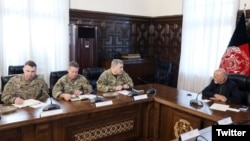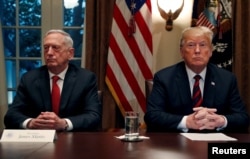Gen. Mark Milley, the Army chief of staff and incoming top U.S. general, has met with Afghan President Ashraf Ghani at the presidential palace, a day after U.S. President Donald Trump criticized U.S. efforts in the war-torn country.
U.S. and Afghan officials confirmed to VOA that Milley and Ghani discussed the "positive effects" of the U.S. strategy for Afghanistan and the region Thursday.
"General Milley said that the U.S. will continue to support an Afghan-led and Afghan-owned peace process," tweeted Samim Arif, the deputy spokesman to the Afghan president.
Another spokesperson for the president confirmed the two also discussed the "long-term process of Afghan self-sufficiency" to enable the government of Afghanistan "to stay on its own feet." Gen. Austin "Scott" Miller, the top U.S. commander in Afghanistan, also was present at Thursday's meeting.
Trump's criticism
The news came a day after U.S. President Donald Trump criticized U.S. military efforts in Afghanistan, slamming military leadership.
"I gave our generals all the money they wanted. They didn't do such a great job in Afghanistan," Trump said Wednesday.
Taking a swipe at former Secretary of Defense Jim Mattis, Trump told reporters Mattis' performance in Afghanistan was "not too good."
"I'm not happy about what he's done in Afghanistan, and I shouldn't be happy," Trump said.
Mattis resigned from his office Dec. 20, handing a resignation letter to the president that said Trump had the "right to have a secretary of defense whose views are better aligned" with his.
The letter pointed out Mattis' differences with Trump on the value of alliances and partnerships — Mattis said the United States could not protect its interests without "maintaining strong alliances and showing respect to those allies" — and their contrasting approaches to "authoritarian" nations like China and Russia.
Mattis agreed to stay at his post through February to "allow sufficient time for a successor to be nominated and confirmed," but Trump decided to replace him earlier, tapping Deputy Secretary of Defense Pat Shanahan to take the post as of Jan. 1.
"As you know, President [Barack] Obama fired him [Mattis], and essentially so did I," Trump said Wednesday.
The word "fired" sharply contrasted with the words Trump used to announced Mattis' resignation on Dec. 20, when Trump said Mattis was "retiring, with distinction" after making "tremendous progress."
Officials have said Trump's view of Mattis changed after watching media coverage of the defense leader's resignation.
'Bizarre' Soviet history?
Trump also provided some unsubstantiated, off-the-cuff remarks Wednesday on Afghanistan's historical connection to the Soviet Union. Afghan officials have sought clarification about the remarks.
Trump claimed "the reason Russia was in Afghanistan was because terrorists were going into Russia."
The Washington Post and BBC have deemed the comments "bizarre" and "bad history." The Soviet Union's push into Afghanistan has been historically viewed as an attempt to impose communism abroad, not a response to terrorists striking Soviet territory.
"No, there weren't terrorists coming into the Soviet Union during the Afghanistan war that I recall," Michael O'Hanlon, a senior fellow in defense foreign policy for the Brookings Institution, told VOA.
Trump also sharply veered from the American stance on the Afghan war, saying Wednesday that the Soviets were "right" to be in Afghanistan. The United States supported the Afghan mujahedeen in this war, believing the Soviets had invaded their southern neighbor.
Kabul, upset over the comments, issued a statement reminding the international community that "the United Nations General Assembly unanimously adopted a resolution condemning the aggression by the former Soviet Union" during the invasion of Afghanistan decades ago.
The Afghan presidential palace also sought an explanation concerning differences between Washington's "official statements and official policy."
"Our relations with the world are outlined on the basis of common interest, and the international forces in Afghanistan are present in Afghanistan, not only for Afghanistan, but for the sake of security of the world and friendly countries, too," the Afghan government said.
Trump also said the Soviet Union's war with Afghanistan "bankrupted" the country. Experts agree the Soviets' war in Afghanistan was one of many contributors to the USSR's demise, but they stress that the major economic factors that hurt the Soviet Union were falling oil prices and the aftermath of Moscow's economic restructuring.
Ekram Shinwari in Kabul and Akmal Dawi of VOA's Afghan service contributed to this report. Ayaz Gul contributed to this report from Islamabad.






